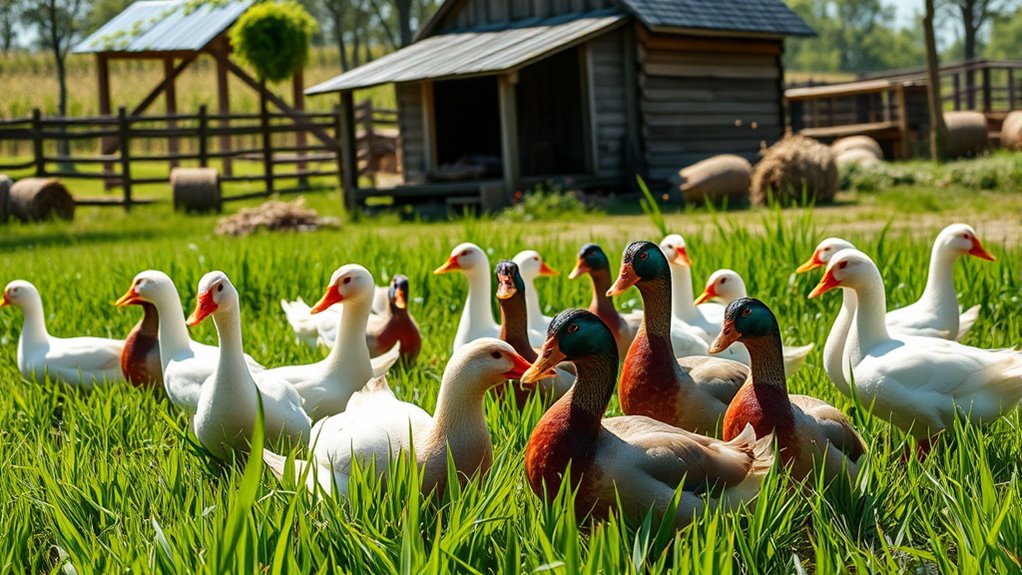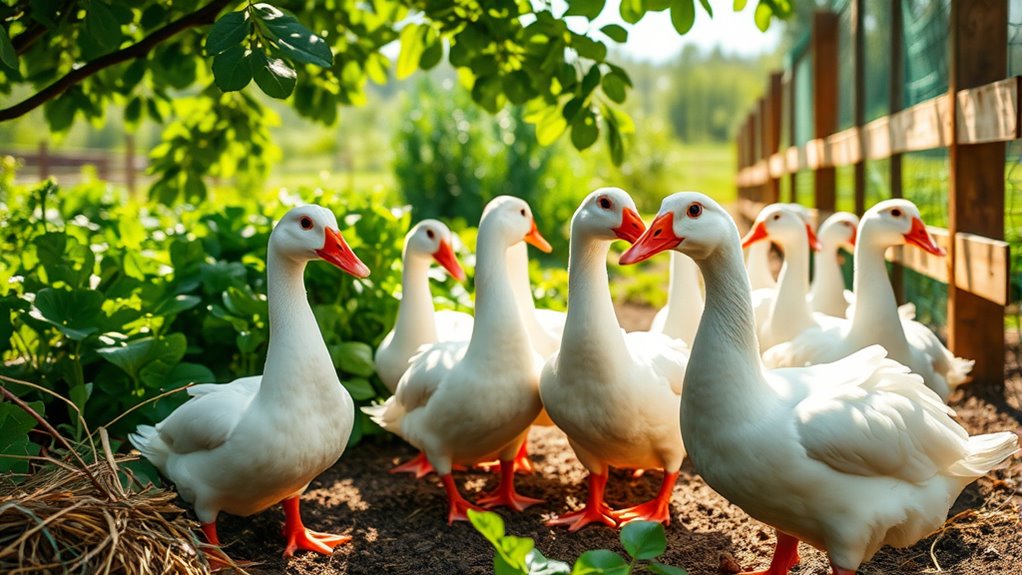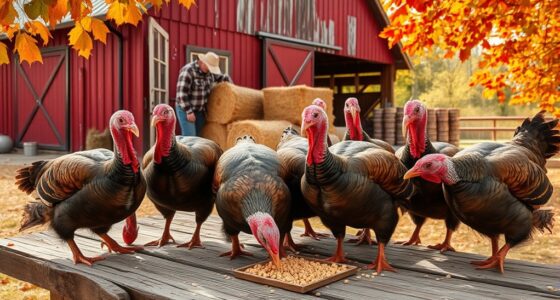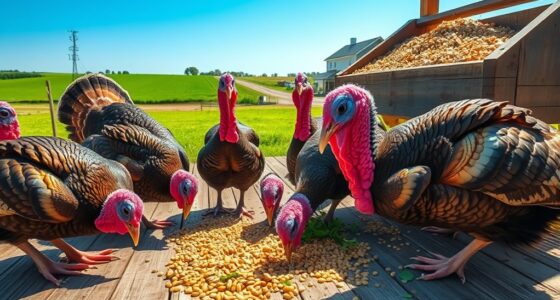Raising ducks for eggs and pest control is a smart, eco-friendly choice. Ducks thrive in wetter environments, provide fresh eggs with richer flavor, and naturally reduce pests like insects and snails. Choosing the right breed based on your goals and environment guarantees healthy, happy ducks that lay regularly and help keep pests at bay. To maximize benefits and minimize issues, you’ll want to learn about different breeds, space needs, and care tips—there’s more to discover that can make your duck-raising success even smoother.
Key Takeaways
- Choose prolific laying breeds like Khaki Campbell or Indian Runner for steady egg production.
- Select foraging breeds such as Rouen or Muscovy to naturally control pests.
- Provide adequate outdoor space and water access to support active, healthy ducks.
- Ensure breed compatibility with your climate and environment for optimal health.
- Manage social behavior and predators to maintain a safe, peaceful, productive flock.

Raising ducks can be a rewarding experience that offers fresh eggs, natural pest control, and enjoyable companionship. When you’re deciding whether to keep ducks or chickens, it’s important to understand their differences to make the best choice for your needs. Ducks tend to be more water-loving and adaptable to wetter environments, while chickens prefer dry, well-drained areas. Ducks generally produce eggs that are slightly larger and often have a richer flavor compared to chicken eggs. They also tend to be quieter, making them a good option if noise is a concern. Chickens, on the other hand, are usually more straightforward to house and tend to lay more eggs overall, but they can be more prone to certain predators and might require more space for foraging. Knowing these differences helps you decide whether ducks or chickens fit your lifestyle and environment better.
Once you’ve chosen to raise ducks, selecting the ideal duck breed is essential. Not all breeds are suited for egg production or pest control, so you’ll want to pick a breed that aligns with your goals. For instance, Khaki Campbell and Indian Runner ducks excel at laying eggs and are known for their prolific output, making them ideal if you want a steady supply of fresh eggs. If pest control is your priority, breeds like the Rouen or Muscovy ducks are excellent because of their foraging habits—they’ll happily root through your yard, eating insects, larvae, and even small pests. When choosing a breed, consider your climate, space, and the duck’s temperament. Some breeds are more tolerant of cold, while others thrive in warmer climates. Also, think about their activity level and whether they’ll be content in a more confined space or need a larger outdoor area to forage. Additionally, understanding the cultural significance of certain breeds can help you select ducks that not only meet your needs but also align with your personal or regional traditions.
Ideal duck breed selection isn’t just about egg or pest control ability; it also involves considering their care requirements and temperament. For example, if you prefer a quieter, more docile duck, the Saxony or Pekin might be better choices. For those with limited space, smaller breeds like Call Ducks could be advantageous. By researching each breed’s specific needs, you ensure your ducks are happy, healthy, and productive. Proper breed selection also means fewer health issues and better integration into your existing setup. Taking into account the environmental adaptability of each breed helps you choose ducks that will thrive in your particular climate and conditions. It’s also beneficial to consider their foraging habits, which can impact how much supplemental feed your ducks will require. Additionally, understanding their social behavior can help you manage multiple ducks more effectively, preventing bullying or loneliness. So, take the time to assess your environment, what you want from your ducks, and how much effort you’re willing to put into their care. This thoughtful approach guarantees you’ll enjoy the many benefits of raising ducks—fresh eggs, natural pest control, and the companionship of these lively birds—while minimizing frustration and maximizing success.
Frequently Asked Questions
What Are the Best Duck Breeds for Egg Production?
When choosing the best duck breeds for egg production, consider their nesting habits and egg-laying frequency. Khaki Campbell ducks are excellent, laying up to 300 eggs annually, and they are active nesters, making egg harvesting easier. Indian Runner ducks are also prolific layers with good duck nesting behaviors. Both breeds are hardy and efficient, ensuring you get consistent eggs with less hassle during egg harvesting.
How Do I Prevent Ducks From Escaping My Yard?
To prevent ducks from escaping your yard, you should start with secure fencing options like welded wire or chain-link fences, ensuring they’re tall enough to contain your ducks. Adding predator deterrents, such as motion-activated lights or fencing topped with electric wires, helps keep predators at bay. Regularly check for gaps or weak spots in your fencing, and reinforce them promptly to maintain a safe, enclosed environment for your ducks.
What Should I Feed Ducks for Optimal Egg Quality?
To guarantee ideal egg quality, you should focus on providing a balanced diet with appropriate nutritional supplements. Maintain a consistent feeding schedule, ideally twice a day, to keep your ducks healthy and productive. Include high-quality poultry feed, grains, and fresh greens. Adding calcium sources like crushed oyster shells supports eggshell strength. Regularly monitor their diet and adjust as needed to keep them healthy and laying high-quality eggs.
How Do I Handle Duck Health Issues and Diseases?
Did you know that ducks can be prone to over 20 common health issues? To handle duck health problems, you should regularly monitor their well-being with consistent duck health monitoring, looking for signs like lethargy or abnormal droppings. Use safe quack remedies when appropriate, but consult a vet for persistent issues. Staying attentive helps prevent minor problems from becoming serious, ensuring your ducks stay healthy and productive.
What Are the Legal Regulations for Keeping Ducks Locally?
You should start by checking your local regulations regarding keeping ducks. Many areas require you to obtain a local licensing permit and follow zoning restrictions to make sure you’re compliant. These rules can vary widely, so contact your city or county office for specific details. Understanding and adhering to these regulations helps prevent legal issues and ensures a safe, enjoyable experience with your ducks.
Conclusion
So, after all this, you might think raising ducks is just about eggs and pest control. But here’s the irony: while they’re great for your garden, those adorable waddlers can also turn into noisy, messy little troublemakers. Still, isn’t it worth it? With a few quirks and a splash of patience, you’ll enjoy the benefits—plus, you get to say you’re living with your very own feathered pest control squad. Who knew?










